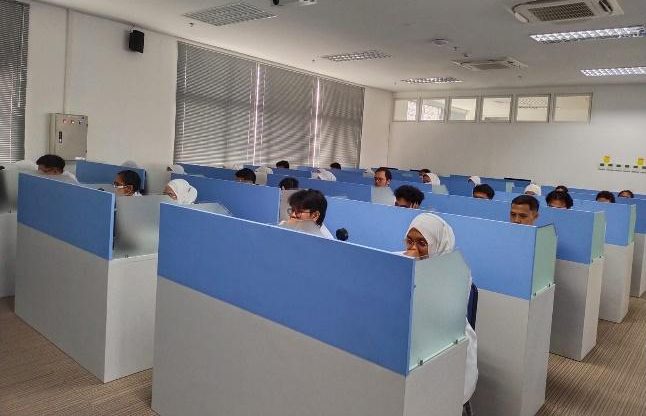The Faculty of Dentistry at Universitas Gadjah Mada (FKG UGM) has once again organized a Computer-Based Test (CBT) for the Oral Disease Clerkship Program (IPM) on Wednesday, 25 September 2024.
The exam took place in the CBT room on the 5th floor of the Dental Learning Center (DLC) building, FKG UGM, and was attended by 114 students divided into two sessions. The first session took place from 08:00 AM to 10:00 AM with 57 students, while the second session ran from 10:00 AM to 12:00 PM with an equal number of participants.
drg. Tjut Intan Permata Sari, Sp.PM., the head of the Oral Disease Clerkship Program, led the event, which was also supported by all lecturers from the Department of Oral Disease and educational staff who served as examiners.
“We hope this exam will enhance students' academic competence,” said drg. Tjut Intan.
She added, “This CBT is not just an evaluation tool, but also an integral part of the curriculum to ensure that future dentists have a solid theoretical foundation and are prepared to provide quality care.”
The CBT method used in this exam offers several key advantages, including time and resource efficiency, data accuracy and security, flexibility, quick feedback, the development of digital skills, and a more comprehensive evaluation.
Furthermore, CBT has become a widely recognized evaluation method in various educational institutions due to its ability to provide a more structured and modern exam experience.
Through the implementation of this CBT exam, FKG UGM strives to offer better quality education and prepare students to face professional challenges in the field of oral health. This event is also an important step in preparing competent and professional future dentists who can make a meaningful contribution to public health.
As a result, students are expected to prepare thoroughly, understand the material deeply, and approach the exam with confidence. This aligns with the Department of Oral Disease’s commitment to supporting the Sustainable Development Goals (SDGs), particularly Goal 3 (Good Health and Well-being) and Goal 4 (Quality Education).
Authors: Pram, Anjar, & drg. Tjut Intan Permata Sari, Sp. PM.

